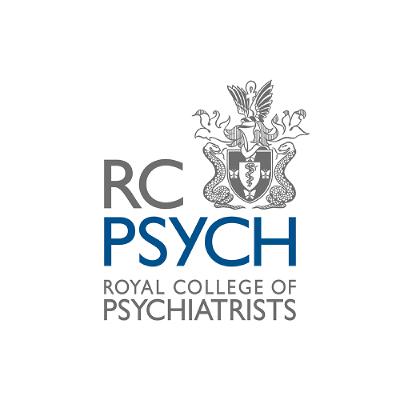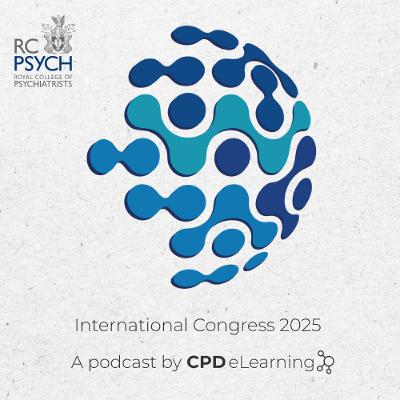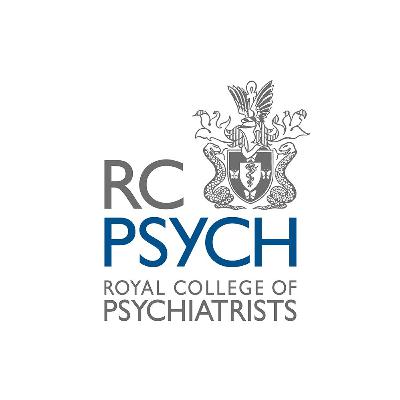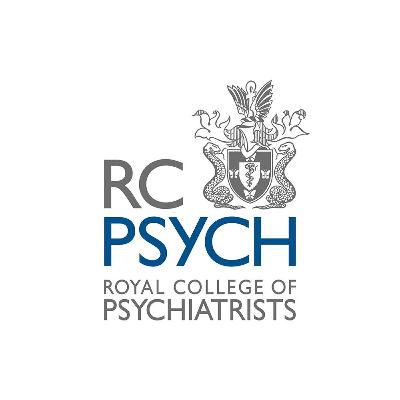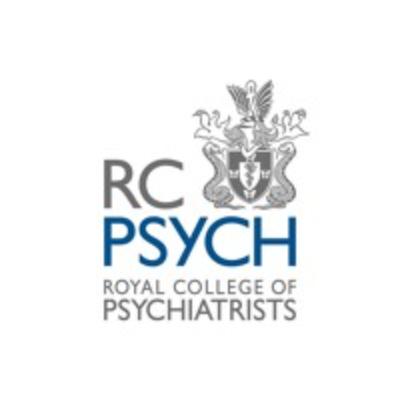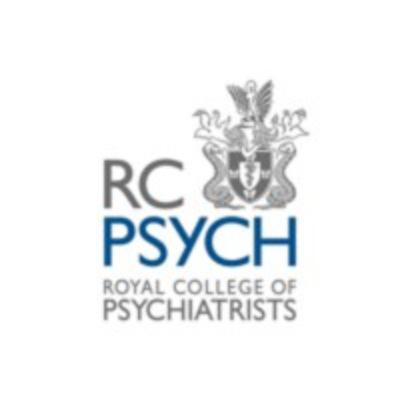Discover CPD eLearning talks to...
CPD eLearning talks to...

CPD eLearning talks to...
Author: Royal College of Psychiatrists
Subscribed: 86Played: 6,114Subscribe
Share
© All rights reserved
Description
These podcasts are similar to those on the RCPsych website, but have been recorded specifically for CPD eLearning. Access to the recordings is free, but you need to be a CPD eLearning subscriber in order to take the test at the end and gain CPD certification. Please note that the views of the interviewees are not necessarily those of the Royal College of Psychiatrists.
67 Episodes
Reverse
As psychiatrists, it is important to consider how a young person’s interactions with healthcare professionals can be a key moment in their life, where their agency is either reaffirmed or threatened and undermined.
In this podcast episode, we explore the role of agency in youth mental health, and how upholding this within the therapeutic relationship can have a direct impact on future health outcomes. With the help of our expert panel, we review the impact of optimising young people's agency in conversations about mental health and treatment.
If you would like to share your thoughts on this podcast with the interviewees, please complete this short form: https://docs.google.com/forms/d/e/1FAIpQLSdC9SmWpFpW_qeuPBFtou40VIHqaO75LVV11L9t5fTILc0TsQ/viewform
Disclaimer: Thank you for listening to this Royal College of Psychiatrists CPD eLearning podcast. This podcast provides information, not advice. The content in this podcast is provided for general information only and is not intended to, and does not amount to, advice that you should rely on. It is not an alternative to specific, professional advice.
Although we make reasonable efforts to present accurate information in our podcasts, we make no representations, warranties or guarantees, whether expressed or implied, that the content in this podcast is accurate, complete or up to date.
If you have any questions about any medical matter, you should consult your doctor or other professional healthcare provider without delay. If you think you are experiencing any medical condition, you should seek immediate attention from a doctor or professional healthcare provider.
Please note that the views of the interviewees are not necessarily those of the Royal College of Psychiatrists.
In our Big Questions in Psychiatry podcast series, we explore the complex and messy questions shaping psychiatry.
In this podcast, we look at the role of medications in psychiatric disorders, the stigma associated with psychotropic medication and whether or not they truly are more problematic than medications used for physical illnesses. Prof Subodh Dave interviews the lead author of ‘The Maudsley Prescribing Guidelines’, Prof David Taylor, to uncover whether or not medications can work ever work in psychiatric disorders.
The video-based version of this podcast is available via the CPD eLearning subscription on the eLearning Hub.
Disclaimer: Thank you for listening to this Royal College of Psychiatrists CPD eLearning podcast. This podcast provides information, not advice. The content in this podcast is provided for general information only and is not intended to, and does not amount to, advice that you should rely on. It is not an alternative to specific, professional advice.
Although we make reasonable efforts to present accurate information in our podcasts, we make no representations, warranties or guarantees, whether expressed or implied, that the content in this podcast is accurate, complete or up to date.
If you have any questions about any medical matter, you should consult your doctor or other professional healthcare provider without delay. If you think you are experiencing any medical condition, you should seek immediate attention from a doctor or professional healthcare provider.
Please note that the views of the interviewees are not necessarily those of the Royal College of Psychiatrists.
Human rights promotion and protection continue to remain highly relevant in psychiatric practice, so it is imperative that psychiatrists are aware of developments being made in international law.
Chair of the Royal College of Psychiatrists’ Special Committee on Human Rights, Professor Piyal Sen, presents this podcast to highlight the central role of human rights in psychiatric practice. He is joined by the co-authors of Mental Health and Human Rights (2024), Professor Norman Sartorius and Professor Neeraj Gill, as well as the first permanent Human Rights Officer at the NHS, Dr Tallyn Gray to discuss the role that psychiatrists can play in upholding and advocating for the rights of their patients.
Disclaimer: Thank you for listening to this Royal College of Psychiatrists CPD eLearning podcast. This podcast provides information, not advice. The content in this podcast is provided for general information only and is not intended to, and does not amount to, advice that you should rely on. It is not an alternative to specific, professional advice.
Although we make reasonable efforts to present accurate information in our podcasts, we make no representations, warranties or guarantees, whether expressed or implied, that the content in this podcast is accurate, complete or up to date.
If you have any questions about any medical matter, you should consult your doctor or other professional healthcare provider without delay. If you think you are experiencing any medical condition, you should seek immediate attention from a doctor or professional healthcare provider.
Please note that the views of the interviewees are not necessarily those of the Royal College of Psychiatrists.
Mental health issues in premenstrual disorders often occur in the second phase of the menstrual cycle.
Dr Sophie Behrman and Dimple Khatiri join guest presenter Dr Katrina Peebles to discuss common presentations of premenstrual dysphoric disorder (PMDD) and the wider social impact of PMDD and associated stigma, and to offer an overview of the available treatment options.
Listener discretion is advised as this podcast covers themes relating to eating disorders and suicidal ideation. Listeners are advised to refer to this podcast’s further reading page, which includes relevant patient resources that the Royal College of Psychiatrists has produced on this topic. This is available via elearning@rcpsych.ac.uk.
The College will be publishing a position statement on menopause and mental health in due course. It will set out critical evidence alongside detailed recommendations for decision-makers on how to address challenges and spread best practice.
Disclaimer: Thank you for listening to this Royal College of Psychiatrists CPD eLearning podcast. This podcast provides information, not advice. The content in this podcast is provided for general information only and is not intended to, and does not amount to, advice that you should rely on. It is not an alternative to specific, professional advice.
Although we make reasonable efforts to present accurate information in our podcasts, we make no representations, warranties or guarantees, whether expressed or implied, that the content in this podcast is accurate, complete or up to date.
If you have any questions about any medical matter, you should consult your doctor or other professional healthcare provider without delay. If you think you are experiencing any medical condition, you should seek immediate attention from a doctor or professional healthcare provider.
Please note that the views of the interviewees are not necessarily those of the Royal College of Psychiatrists.
October marks the annual Stoptober initiative, a powerful reminder of the life-saving potential of quitting smoking.
In this podcast episode, join guest presenter Dr Claire Jones in exploring why smoking cessation is considered the single most impactful intervention for improving health outcomes, and discover how small changes in clinical practice can lead to life-changing outcomes.
Disclaimer: Thank you for listening to this Royal College of Psychiatrists CPD eLearning podcast. This podcast provides information, not advice. The content in this podcast is provided for general information only and is not intended to, and does not amount to, advice that you should rely on. It is not an alternative to specific, professional advice.
Although we make reasonable efforts to present accurate information in our podcasts, we make no representations, warranties or guarantees, whether expressed or implied, that the content in this podcast is accurate, complete or up to date.
If you have any questions about any medical matter, you should consult your doctor or other professional healthcare provider without delay. If you think you are experiencing any medical condition, you should seek immediate attention from a doctor or professional healthcare provider.
Please note that the views of the interviewees are not necessarily those of the Royal College of Psychiatrists.
Following their presentation at the 2025 International Congress, speakers at the ‘No mental health without oral health’ session expanded on their talk with the CPD eLearning Podcast Editor, Dr Nadia Imran.
In this podcast, Dr Ed Beveridge, Prof Steve Kisely and Dr Easter Joury uncover the intersection between physical and psychiatric comorbidity, the effects of psychotropics on oral health, and clear and helpful guidance about how psychiatrists can help their patients improve their oral health.
Disclaimer: Thank you for listening to this Royal College of Psychiatrists CPD eLearning podcast. This podcast provides information, not advice. The content in this podcast is provided for general information only and is not intended to, and does not amount to, advice that you should rely on. It is not an alternative to specific, professional advice.
Although we make reasonable efforts to present accurate information in our podcasts, we make no representations, warranties or guarantees, whether expressed or implied, that the content in this podcast is accurate, complete or up to date.
If you have any questions about any medical matter, you should consult your doctor or other professional healthcare provider without delay. If you think you are experiencing any medical condition, you should seek immediate attention from a doctor or professional healthcare provider.
Please note that the views of the interviewees are not necessarily those of the Royal College of Psychiatrists.
Thirteen years ago, Dr Peter Mason was interviewed by CPD eLearning about adult attention-deficit hyperactivity disorder (ADHD) and comorbid psychosis. In this podcast, we revisit the topic.
Together with CPD eLearning Trainee Editor, Dr Thomas Fyall, and new panelist Dr Ahmed Samei Huda, they look at the interaction between adult ADHD and comorbid psychosis alongside a number of case reports, outlining common symptoms, associated challenges and principles for safe treatment.
Disclaimer: This podcast provides information, not advice. The content in this podcast is provided for general information only and is not intended to, and does not, mount to advice which you should rely on. This is not an alternative to specific advice. Although we make reasonable efforts to present accurate information in our podcasts, we make no representations, warranties or guarantees, whether expressed or implied, that the content in this podcast is accurate, complete or up to date. If you have any questions about any medical matter, you should consult your doctor or other professional healthcare provider without delay. If you think you are experiencing any medical condition, you should seek immediate attention from a doctor or professional healthcare provider. Please note that the views of the interviewees are not necessarily those of the Royal College of Psychiatrists.
The Royal College of Psychiatrists coat of arms – featuring the serpent-entwined Staff of Asclepius, the Greek god of medicine and healing – also bears the College motto, ‘Let Wisdom Guide’.
Wisdom is often personified as a female figure – Sophia (Greek) or Hokmah (Hebrew) – a figure that is the source of practical knowledge and a moral compass, emphasising ethical conduct and thoughtful living. And indeed, it is wisdom we need to understand the complexities of life – particularly when it intersects with mental illness, as it often does in psychiatry.
Our new series of podcasts, Big Questions in Psychiatry, explores the complex and sometimes messy issues shaping psychiatry. With the help of world experts in the field and utilising a grounding panel of patients, carers, clinicians, learners and service managers, we ask about:
- the philosophical notion of responsibility and its relation to blame in mental illness
- phenomenology in psychiatry – how do we, either as patients or as clinicians, know what is real and what is not, for example, when dealing with hallucinations?
-the role of artificial intelligence (AI) in psychiatry – is AI friend or foe?
Disclaimer: This podcast provides information, not advice. The content in this podcast is provided for general information only and is not intended to, and does not, mount to advice which you should rely on. This is not an alternative to specific advice. Although we make reasonable efforts to present accurate information in our podcasts, we make no representations, warranties or guarantees, whether expressed or implied, that the content in this podcast is accurate, complete or up to date. If you have any questions about any medical matter, you should consult your doctor or other professional healthcare provider without delay. If you think you are experiencing any medical condition, you should seek immediate attention from a doctor or professional healthcare provider. Please note that the views of the interviewees are not necessarily those of the Royal College of Psychiatrists.
As psychiatrists, we’re aware that patients face problems with their health. Hence, we need clear management strategies to prevent physical health challenges.
In this podcast, we will review the current research and policy surrounding prevention and management of cardiometabolic health conditions, and what we can do as psychiatrists to improve the physical health of patients.
We will also discuss the new Lancet Psychiatry physical health commission on physical health side-effects of psychotropics.
Disclaimer: This podcast provides information, not advice. The content in this podcast is provided for general information only and is not intended to, and does not, mount to advice which you should rely on. This is not an alternative to specific advice. Although we make reasonable efforts to present accurate information in our podcasts, we make no representations, warranties or guarantees, whether expressed or implied, that the content in this podcast is accurate, complete or up to date. If you have any questions about any medical matter, you should consult your doctor or other professional healthcare provider without delay. If you think you are experiencing any medical condition, you should seek immediate attention from a doctor or professional healthcare provider. Please note that the views of the interviewees are not necessarily those of the Royal College of Psychiatrists.
The Royal College of Psychiatrists’ coat of arms – featuring the serpent-entwined Staff of Asclepius, the Greek God of medicine and healing – also bears the College motto, ‘Let Wisdom Guide’.
Wisdom is often personified as a female figure – Sophia (Greek) or Hokmah (Hebrew) – a figure that is the source of practical knowledge and a moral compass, emphasising ethical conduct and thoughtful living.
And indeed it is wisdom we need to understand the complexities of life – particularly when it intersects with mental illness, as it often does in psychiatry.
Our new series of podcasts, Big Questions in Psychiatry, explores the complex and sometimes messy issues shaping psychiatry. With the help of world experts in the field and utilising a grounding panel of patients, carers, clinicians, learners and service managers, we ask about:
- the philosophical notion of responsibility and its relation to blame in mental illness
phenomenology in psychiatry
– how do we, either as patients or as clinicians, know what is real and what is not, for example when dealing with hallucinations
- the role of artificial intelligence (AI) in psychiatry – is AI friend or foe?
Disclaimer: Thank you for listening to this Royal College of Psychiatrists’ CPD eLearning podcast. This podcast provides information, not advice. The content in this podcast is provided for general information only and is not intended to, and does not, mount to advice which you should rely on. This is not an alternative to specific advice.
Although we make reasonable efforts to present accurate information in our podcasts, we make no representations, warranties or guarantees, whether expressed or implied, that the content in this podcast is accurate, complete or up to date.
If you have any questions about any medical matter, you should consult your doctor or other professional healthcare provider without delay. If you think you are experiencing any medical condition, you should seek immediate attention from a doctor or professional healthcare provider.
Please note that the views of the interviewees are not necessarily those of the Royal College of Psychiatrists.
This podcast covers common mental health issues that may arise when service personnel leave the military and become veterans.
We examine the transition period, looking at the risk factors associated with this and the support systems available. Mental health provisions for veterans can seem like a confusing topic to NHS psychiatrists. However, it is likely that, in clinical practice, all psychiatrists will come into contact with this cohort of patients and it is important for psychiatrists to have a sense of understanding.
This podcast will aim to review some commonly held misconceptions about veterans’ mental health and discuss further the support available when service personnel leave the military.
Disclaimer: This podcast provides information, not advice. The content in this podcast is provided for general information only and is not intended to, and does not, mount to advice which you should rely on. This is not an alternative to specific advice. Although we make reasonable efforts to present accurate information in our podcasts, we make no representations, warranties or guarantees, whether expressed or implied, that the content in this podcast is accurate, complete or up to date. If you have any questions about any medical matter, you should consult your doctor or other professional healthcare provider without delay. If you think you are experiencing any medical condition, you should seek immediate attention from a doctor or professional healthcare provider. Please note that the views of the interviewees are not necessarily those of the Royal College of Psychiatrists.
Mental health in the military may seem like a confusing topic for NHS psychiatrists. However, there may be interfaces between the military and NHS at key points in a service person's journey, which is why it is important for NHS psychiatrists to have a sense of understanding of this topic.
This podcast will aim to review some commonly held misconceptions about mental health within the military and introduce the support available when service personnel leave the military.
Disclaimer: This podcast provides information, not advice. The content in this podcast is provided for general information only and is not intended to, and does not, mount to advice which you should rely on. This is not an alternative to specific advice. Although we make reasonable efforts to present accurate information in our podcasts, we make no representations, warranties or guarantees, whether expressed or implied, that the content in this podcast is accurate, complete or up to date. If you have any questions about any medical matter, you should consult your doctor or other professional healthcare provider without delay. If you think you are experiencing any medical condition, you should seek immediate attention from a doctor or professional healthcare provider. Please note that the views of the interviewees are not necessarily those of the Royal College of Psychiatrists.
In this podcast, Dr Kamran Ahmed talks to Professor Klaus Lieb about the Cochrane review conducted by his team on trials of pharmacological treatments for borderline personality disorder. The findings of the review and their implications are discussed.
Published: March 2010
Disclaimer: This podcast provides information, not advice. The content in this podcast is provided for general information only and is not intended to, and does not, mount to advice which you should rely on. This is not an alternative to specific advice. Although we make reasonable efforts to present accurate information in our podcasts, we make no representations, warranties or guarantees, whether expressed or implied, that the content in this podcast is accurate, complete or up to date. If you have any questions about any medical matter, you should consult your doctor or other professional healthcare provider without delay. If you think you are experiencing any medical condition, you should seek immediate attention from a doctor or professional healthcare provider. Please note that the views of the interviewees are not necessarily those of the Royal College of Psychiatrists.
Psychiatrists infrequently encounter catatonic presentations in clinical practice. In this podcast, CPD eLearning Deputy Editor, Dr Bruce Tamilson, speaks to Dr Jonathan Rogers about significant developments that have been made in diagnosing catatonia. This includes identifying catatonia, differentiating from similar presentations, and discussing the various approaches to assessment and investigations.
Disclaimer: This podcast provides information, not advice. The content in this podcast is provided for general information only and is not intended to, and does not, mount to advice which you should rely on. This is not an alternative to specific advice. Although we make reasonable efforts to present accurate information in our podcasts, we make no representations, warranties or guarantees, whether expressed or implied, that the content in this podcast is accurate, complete or up to date. If you have any questions about any medical matter, you should consult your doctor or other professional healthcare provider without delay. If you think you are experiencing any medical condition, you should seek immediate attention from a doctor or professional healthcare provider. Please note that the views of the interviewees are not necessarily those of the Royal College of Psychiatrists.
Following their presentation at the Royal College of Psychiatrists’ International Congress, Dr Nikki Nabavi, Dr Rosemary Gordon and Dr Suhana Ahmed spoke with CPD eLearning Podcast Editor, Dr Nadia Imran.
In this podcast they discuss different leadership styles, allyship and its importance within the workplace, and share their experiences of navigating the challenges that women often face in psychiatry and healthcare, particularly within leadership roles.
Disclaimer: This podcast provides information, not advice. The content in this podcast is provided for general information only and is not intended to, and does not, mount to advice which you should rely on. This is not an alternative to specific advice. Although we make reasonable efforts to present accurate information in our podcasts, we make no representations, warranties or guarantees, whether expressed or implied, that the content in this podcast is accurate, complete or up to date. If you have any questions about any medical matter, you should consult your doctor or other professional healthcare provider without delay. If you think you are experiencing any medical condition, you should seek immediate attention from a doctor or professional healthcare provider. Please note that the views of the interviewees are not necessarily those of the Royal College of Psychiatrists.
This podcast is a discussion between CPD eLearning’s Podcast Editor, Dr Nadia Imran, and RCPsych’s Planetary Health and Sustainability Committee member, Dr Daniel Harwood.
In this podcast, Dr Harwood highlights the benefits of nature-based interventions in psychiatry for both patients and wildlife, such as nature walks, wildlife gardening and habitat management. Dr Harwood provides examples of simple yet effective nature-based interventions.
Disclaimer: This podcast provides information, not advice. The content in this podcast is provided for general information only and is not intended to, and does not, mount to advice which you should rely on. This is not an alternative to specific advice. Although we make reasonable efforts to present accurate information in our podcasts, we make no representations, warranties or guarantees, whether expressed or implied, that the content in this podcast is accurate, complete or up to date. If you have any questions about any medical matter, you should consult your doctor or other professional healthcare provider without delay. If you think you are experiencing any medical condition, you should seek immediate attention from a doctor or professional healthcare provider. Please note that the views of the interviewees are not necessarily those of the Royal College of Psychiatrists.
Following their presentation at the Royal College of Psychiatrists’ International Congress 2024, Dr Mark Horowitz and Prof David Taylor sat down with CPD eLearning Editor Dr Howard Ryland.
In this podcast, they discuss deprescribing psychotropic medications and the findings in their book, The Maudsley Deprescribing Guidelines (Horowitz and Taylor, 2024).
Disclaimer: This podcast provides information, not advice. The content in this podcast is provided for general information only and is not intended to, and does not, mount to advice which you should rely on. This is not an alternative to specific advice. Although we make reasonable efforts to present accurate information in our podcasts, we make no representations, warranties or guarantees, whether expressed or implied, that the content in this podcast is accurate, complete or up to date. If you have any questions about any medical matter, you should consult your doctor or other professional healthcare provider without delay. If you think you are experiencing any medical condition, you should seek immediate attention from a doctor or professional healthcare provider. Please note that the views of the interviewees are not necessarily those of the Royal College of Psychiatrists.
Following their presentation at the Royal College of Psychiatrists’ International Congress 2024, Dr Rajesh Mohan, Dr Amrit Sachar and Dr Ananta Dave spoke with CPD eLearning’s Podcast Editor, Dr Nadia Imran, to discuss the College’s Act Against Racism guidance.
In this podcast they explain how the guidance can support psychiatrists in tackling racism in the workplace and how it’s already being used by organisations, as well as exploring how to overcome possible obstacles when implementing the guidance. The discussion will enhance the learning and competencies for psychiatrists of all levels of seniority to tackle racism.
Disclaimer: This podcast provides information, not advice. The content in this podcast is provided for general information only and is not intended to, and does not, mount to advice which you should rely on. This is not an alternative to specific advice. Although we make reasonable efforts to present accurate information in our podcasts, we make no representations, warranties or guarantees, whether expressed or implied, that the content in this podcast is accurate, complete or up to date. If you have any questions about any medical matter, you should consult your doctor or other professional healthcare provider without delay. If you think you are experiencing any medical condition, you should seek immediate attention from a doctor or professional healthcare provider. Please note that the views of the interviewees are not necessarily those of the Royal College of Psychiatrists.
Ahead of their presentation at the Royal College of Psychiatrists’ International Congress 2024, Dr Patrick Keown and Prof Claire Henderson spoke with CPD eLearning Podcast Editor, Dr Nadia Imran.
In this podcast, they discuss rising rates of involuntary detention in the age of deinstitutionalisation and the implementation of Advance Choice Documents (ACDs).
Disclaimer: This podcast provides information, not advice. The content in this podcast is provided for general information only and is not intended to, and does not, mount to advice which you should rely on. This is not an alternative to specific advice. Although we make reasonable efforts to present accurate information in our podcasts, we make no representations, warranties or guarantees, whether expressed or implied, that the content in this podcast is accurate, complete or up to date. If you have any questions about any medical matter, you should consult your doctor or other professional healthcare provider without delay. If you think you are experiencing any medical condition, you should seek immediate attention from a doctor or professional healthcare provider. Please note that the views of the interviewees are not necessarily those of the Royal College of Psychiatrists.
Following their presentation at the Royal College of Psychiatrists’ International Congress 2024, Dr Conor Davidson, Dr Alison Lennox and Ms Rhiannon Hawkins spoke with the CPD eLearning Podcast Editor, Dr Nadia Imran.
In this podcast, they discuss the gendered diagnosis gap, unique barriers to accessing mental health care, and reasonable adjustments that can be made for autistic women.
Disclaimer: This podcast provides information, not advice. The content in this podcast is provided for general information only and is not intended to, and does not, mount to advice which you should rely on. This is not an alternative to specific advice. Although we make reasonable efforts to present accurate information in our podcasts, we make no representations, warranties or guarantees, whether expressed or implied, that the content in this podcast is accurate, complete or up to date. If you have any questions about any medical matter, you should consult your doctor or other professional healthcare provider without delay. If you think you are experiencing any medical condition, you should seek immediate attention from a doctor or professional healthcare provider. Please note that the views of the interviewees are not necessarily those of the Royal College of Psychiatrists.


